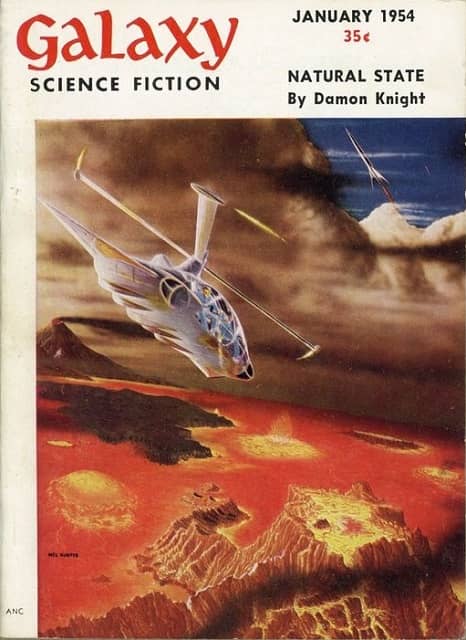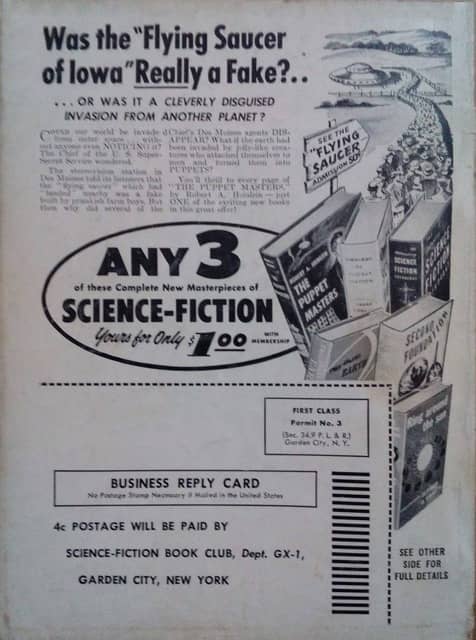Birthday Reviews: Jerome Bixby’s “The Holes Around Mars”
 |
 |
Cover by Mel Hunter
Jerome Bixby was born on January 11, 1923 and died on April 28, 1998. His story “It’s a Good Life” was adapted into an episode of The Twilight Zone and The Twilight Zone Movie. He wrote scripts for four episodes of Star Trek, including “Mirror, Mirror,” and co-wrote a story with Otto Klement which became the basis for the film Fantastic Voyage. He served as the editor of Planet Stories from mid 1950 through July 1951 and went on to serve as Horace L. Gold’s assistant at Galaxy.
When he first envisioned the story that became “The Holes Around Mars,” he was planning on what is now known as flash fiction ending with a joke. He discussed it with Gold, who convinced him to stretch it out and in the writing, he extended it again until it took its present form. It was first published in Galaxy in the January, 1954 issue, edited by Horace L. Gold. The story has been reprinted numerous times and translated into French, German, and Italian.
“The Holes Around Mars” begins with a small crew landing on the red planet and beginning to explore. The narrator, the crew’s mineralogist, notes that the crew has gotten tired of the constant punning by their commander, Allenby, however there is little they can do about it. This admission allows Bixby to fill the story with puns, setting the scene for the final joke, which was the original impetus for the story.
Had Bixby kept the story to its original length, it would not have been memorable, however, in order to get to the ending, he was forced to build an interesting puzzle story for his characters to solve and give the puzzle time to sink in for the reader. By the time the final line is delivered, the reader cares about the solution to the question of what is making strange four-inch holes around the planet Mars, always in a straight line.
The addition of a village of Martians and the way they have built their society around the mystery only adds to the stakes in figuring out what the cause is, especially when Bixby implies that a failure to figure out the solution may prove fatal to Randolph, the mission’s biologist. For all that a pun set the story in motion, most of the puns delivered by Allenby seemed forced throughout the story and the final pun is, perhaps, the weakest.
Reprint reviewed in its the anthology Galaxy: Thirty Years of Innovative Science Fiction, edited by Frederik Pohl, Martin H. Greenberg, and Joseph D. Olander, Playboy Press, 1980.
 Steven H Silver is a fifteen-time Hugo Award nominee and was the publisher of the Hugo-nominated fanzine Argentus as well as the editor and publisher of ISFiC Press for 8 years. He has also edited books for DAW and NESFA Press. He began publishing short fiction in 2008 and his most recently published story is “Big White Men—Attack!” in Little Green Men—Attack! Steven has chaired the first Midwest Construction, Windycon three times, and the SFWA Nebula Conference 5 times as well as serving as the Event Coordinator for SFWA. He was programming chair for Chicon 2000 and Vice Chair of Chicon 7. He has been the news editor for SF Site since 2002.
Steven H Silver is a fifteen-time Hugo Award nominee and was the publisher of the Hugo-nominated fanzine Argentus as well as the editor and publisher of ISFiC Press for 8 years. He has also edited books for DAW and NESFA Press. He began publishing short fiction in 2008 and his most recently published story is “Big White Men—Attack!” in Little Green Men—Attack! Steven has chaired the first Midwest Construction, Windycon three times, and the SFWA Nebula Conference 5 times as well as serving as the Event Coordinator for SFWA. He was programming chair for Chicon 2000 and Vice Chair of Chicon 7. He has been the news editor for SF Site since 2002.
I always wondered if that story wasn’t an inspiration for the Bova/Lewis story “Men of Good Will” (and thus also the John Varley story that uses the same gimmick as “Men of Good Will”, “Scoreboard”.)